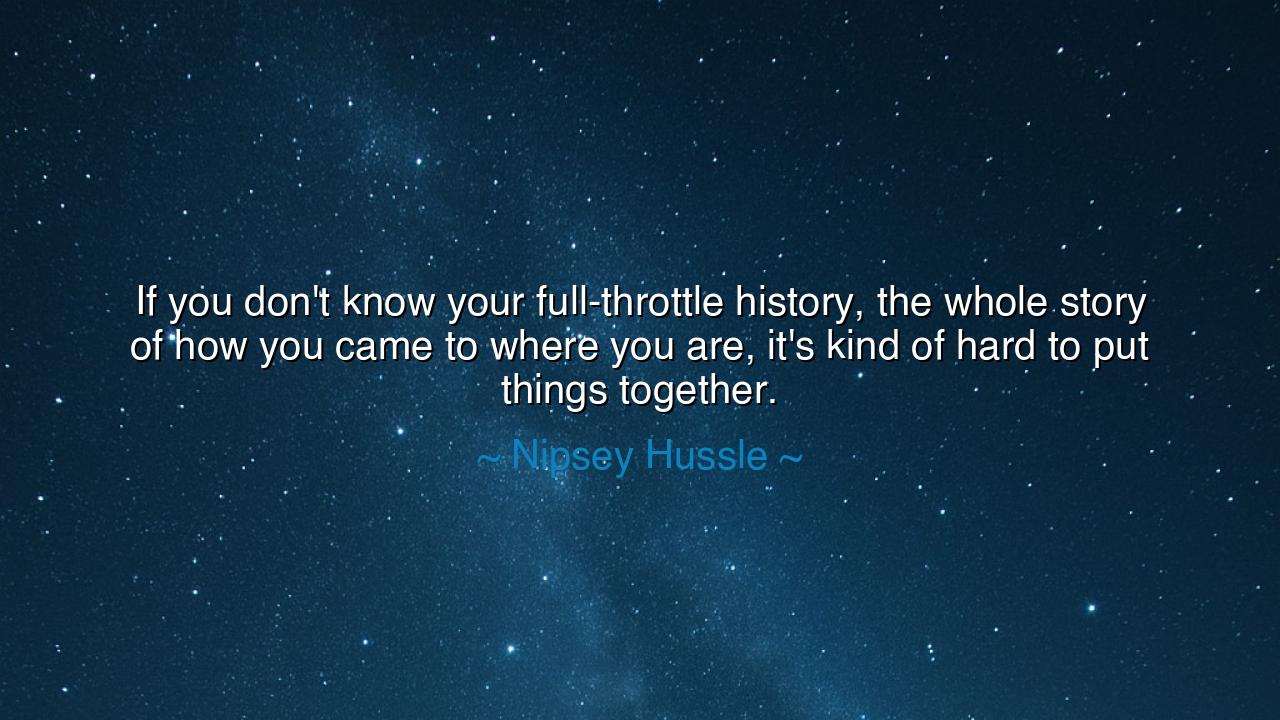
If you don't know your full-throttle history, the whole story of
If you don't know your full-throttle history, the whole story of how you came to where you are, it's kind of hard to put things together.






In the long song of human striving, where men and women rise from struggle toward greatness, the voice of Nipsey Hussle speaks like that of an ancient sage wrapped in the garments of a modern soul. “If you don’t know your full-throttle history, the whole story of how you came to where you are, it’s kind of hard to put things together.” These words, drawn from the depths of a man who rose from the streets to the stars, remind us of one of life’s eternal truths: that memory is the root of identity, and identity the compass of destiny. Without history, we wander; without remembrance, we repeat our losses in endless circles.
In every age, the wise have taught that to know thyself is the beginning of wisdom. Yet Nipsey extends this wisdom beyond the self of the moment—he speaks of the whole story, the unbroken line that stretches from ancestors to descendants, from the soil to the sky. He calls it “full-throttle history”—a vivid phrase that burns with urgency. For to him, history is not a book to be studied; it is a force, alive and roaring, the engine that drives one’s purpose. If we do not know the struggles, victories, and sacrifices that shaped our path, we cannot truly understand the power that flows within us. The present becomes hollow, a body without a soul, and the future becomes a road without direction.
Look to the story of Frederick Douglass, born in chains yet destined to become a voice of freedom. He knew that to liberate a people, one must first restore their memory. “A people without knowledge of their history,” he said, “is like a tree without roots.” It was not enough to break physical bondage; the deeper battle was to reclaim the story of who they were—to remember that they were not slaves by nature, but children of kings, mothers of nations, heirs of resilience. So too did Nipsey Hussle, walking through the alleys of Los Angeles, understand that the battle for his community was not merely one of wealth or opportunity, but of knowledge—the power to trace one’s lineage of struggle and see one’s greatness reflected in the long continuum of human courage.
In the ancient kingdoms, the griots—the keepers of stories—were revered more than soldiers or rulers. They carried in their songs the victories and the wounds of the people. They reminded each generation who they were, and what they could still become. This is what Nipsey calls us to remember: that we each have a griot’s blood within us. We are living stories, bound to those who came before, and responsible to those who come after. To forget one’s history is to lose one’s strength; to know it is to awaken the ancestral fire that never dies.
The words of Nipsey Hussle are also a warning to an age of distraction. In a time when the past is buried beneath the noise of the present, he tells us that understanding our origins is not luxury—it is survival. A person, a community, or a nation that forgets where it came from becomes vulnerable to confusion and division. Without the thread of memory, even the strongest fabric unravels. But those who study their story—who know every wound, every triumph, every moment of grace—stand unshaken, for they carry within them the map of their own becoming.
Yet this teaching is not only for the great or the oppressed—it is for all who seek meaning. To know one’s full-throttle history is to live consciously, to see the invisible currents that shaped your path. It is to honor your teachers, your parents, your ancestors—their mistakes, their wisdom, their resilience. It is to look upon your life not as a collection of random moments, but as part of a divine sequence, a pattern woven with purpose. When you understand the story behind your struggle, even your pain gains meaning, and even your failures become sacred lessons.
So learn, O seeker of truth, the lesson of the ancestors: remember who you are, and remember how you came to be. Seek out your history not as a relic, but as a mirror. Ask the elders to speak, read the chronicles of your people, study the ground on which you stand. For as Nipsey taught, you cannot “put things together” without knowing the pieces that built your foundation. To forget your past is to break the chain of wisdom; to know it is to forge the armor of purpose. And when you carry your history full-throttle—with pride, with knowledge, with understanding—you do not simply live; you continue the story of all who dared to rise before you.






AAdministratorAdministrator
Welcome, honored guests. Please leave a comment, we will respond soon